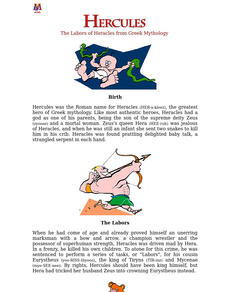Ducksters
Ducksters: Ancient Greece for Kids: Hercules
On this site, learn about a hero of Greek Mythology and son of the god Zeus named Hercules.
Mythweb
Mythweb: Greek Mythology: The Labors of Heracles from Greek Mythology
A modern retelling of the Greek myth of Heracles, also known in Roman mythology as Hercules. The story begins with Heracles' birth and tells of his twelve labors, including defeating the Nemean Lion, the Hydra, the Minotaur, and more....
ClassFlow
Class Flow: Introduction to Greek Mythology
[Free Registration/Login Required] This flipchart is an overview of the 12 major Greek gods with links to their stories, activities, and a short Activotes quiz.
Other
Hermes: Herald of the Immortals
The Olympians depended on Hermes (Roman name "Mercury") to bring them all sorts of news. Learn about his role at this site, which includes a listing of all the times Hermes is mentioned in the Iliad and the Odyssey.
Curated OER
Eternal Egypt: Hermes
Hermes was the son of Zeus and Maia, the daughter of Atlas. His name means "the messenger" because he was the messenger of the gods.
Ted Nellen
Cyber English (By Ted Nellen): Anthropomorphism
This is a glossary entry for the term "Anthropomorphism" including definitions, examples, and a link to more information.
Other
Dionysos
Lengthy discussion of Dionysos that cites a variety of sources. Includes a bibliography, as well as quotations from Euripidies and others.
TED Talks
Ted: Ted Ed: The Ancient Origins of the Olympics
Armand D'Angour explains the evolution of the Olympics. [3:20]
Other
The Classics Pages: The Athenian Agora
Clickable map of the Agora of Athens. Provides information about the buildings contained in the Agora area and the location of the Agora in relation to the rest of the city.










